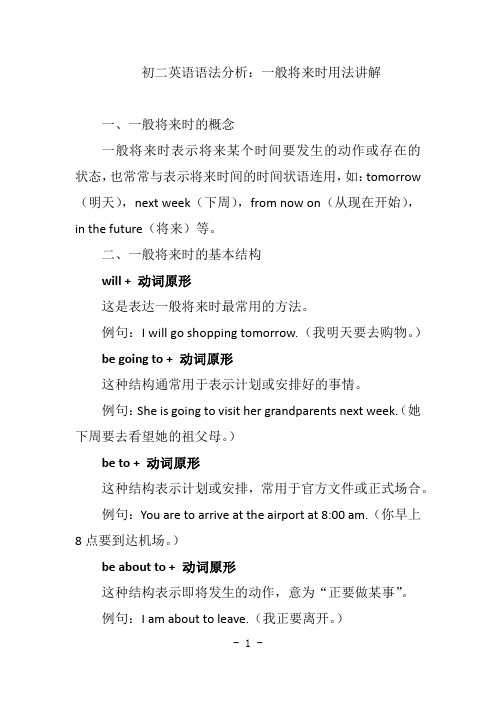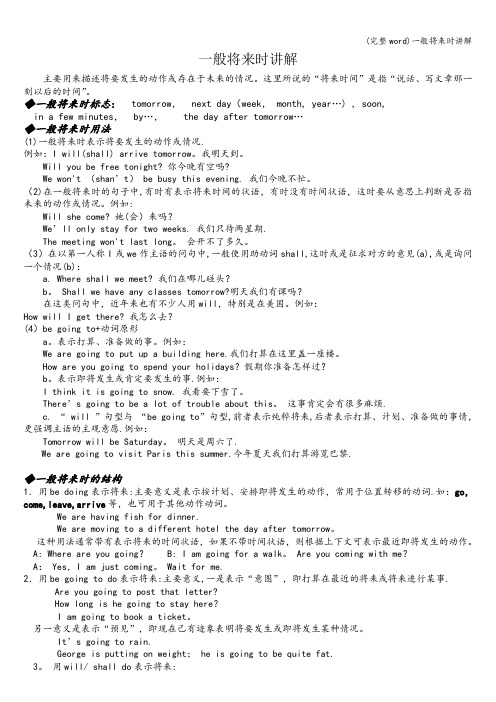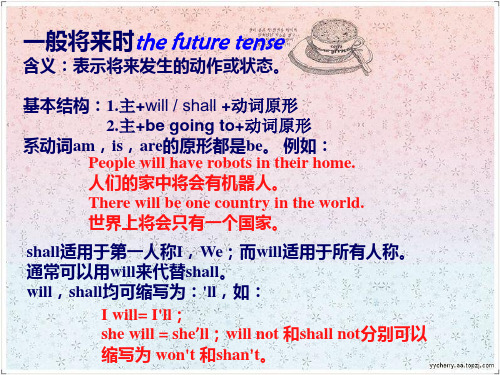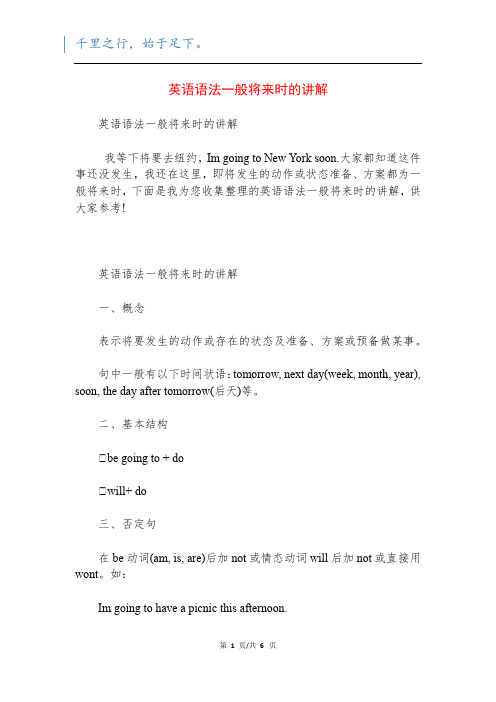一般将来时的讲解
一般将来时时态用法讲解

⼀般将来时时态⽤法讲解⼀般将来时时态1. ⼀般将来时的定义⼀般将来时表⽰在现在看来即将要发⽣的动作或存在的状态。
常⽤时间副词tomorrow, soon或短语next year / week / month, in a few days, in the future, sometime 做状语。
如:What will you do this afternoon?你今天下午⼲什么?We will have a meeting tomorrow. 我们明天要开会。
He is going to study abroad(到国外) next year. 明年他要出国学习。
2. ⼀般将来时的结构及应⽤(1) shall / will + 动词原形。
表⽰即将发⽣的动作或存在的状态。
特别是表⽰客观性的事情或在某条件下要发⽣的事情,只能⽤此结构。
如:What shall we do if he doesn’t come 如果他不来,我们该怎么办?Will you be free this evening 今天晚上有空吗?I think he will tell us the truth(真相)。
我想他会告诉我们真实情况的。
(2) be going to + 动词原形。
表⽰已经计划或安排好了的事情,也可表⽰有迹象表明肯定要发⽣的事情。
如:We are going to have a meeting to discuss (讨论)the matter this evening. 今天晚上开会讨论这件事情。
Look at the black clouds over there. I think it is going to rain soon. 看⼀看那边的乌云,我想天要下⾬了。
There is going to be an English evening this week. 本周要举⾏⼀个英语晚会。
(3) be +现在分词。
初中数学一般将来时专项语法讲解

初中数学一般将来时专项语法讲解一般将来时是表示将来某个时间要发生的动作或事件。
在初中数学中,很多时候我们需要描述将要发生的事情,使用一般将来时就尤为重要了。
I. 构成方法一般将来时由“will/shall + 动词原形”构成。
其中 shall 用得较少,will 是最主要的情态动词。
例如:I will go to school tomorrow.陈述句否定句构成如下:陈述句:I will see you tomorrow.否定句:I will not see you tomorrow.疑问句构成如下:一般疑问:Will you see me tomorrow?(肯定回答:Yes, I will.否定回答: No, I won't.)特殊疑问:What will you do tomorrow? (回答:I will go to school.)II. 动词用法将来时态只是时间状语,用途相当于陈述一件在未来某个时间会发生的事情,如“明天”,“下周”等。
* 表示未来的计划或决定:I will travel next month.* 表示意愿或承诺:I will help you with your homework.* 表示在未来一段时间内会经常发生的动作、或在未来发生的动作是一种惯:He will play basketball every morning.* 表示未来某个时间衔接发生的动作:I will wake up, and then I will brush my teeth.* 表示偶然发生的事情:There will be a party at my friend's house tomorrow.III. 练题1. 我明天早上6点起床。
2. 他下下个月去伦敦。
3. 他会在这个周末打篮球。
4. 我会帮你研究数学。
5. 当你到机场时,我会等你的。
答案:1. I will wake up at 6 tomorrow morning.2. He will go to London next month.3. He will play basketball this weekend.4. I will help you with studying mathematics.5. I will wait for you when you arrive at the airport.初中数学一般将来时是数学学习中的重要部分,希望这份语法讲解能帮助学生更好地掌握此知识点。
初二英语语法分析--一般将来时用法讲解

初二英语语法分析:一般将来时用法讲解一、一般将来时的概念一般将来时表示将来某个时间要发生的动作或存在的状态,也常常与表示将来时间的时间状语连用,如:tomorrow (明天),next week(下周),from now on(从现在开始),in the future(将来)等。
二、一般将来时的基本结构will + 动词原形这是表达一般将来时最常用的方法。
例句:I will go shopping tomorrow.(我明天要去购物。
)be going to + 动词原形这种结构通常用于表示计划或安排好的事情。
例句:She is going to visit her grandparents next week.(她下周要去看望她的祖父母。
)be to + 动词原形这种结构表示计划或安排,常用于官方文件或正式场合。
例句:You are to arrive at the airport at 8:00 am.(你早上8点要到达机场。
)be about to + 动词原形这种结构表示即将发生的动作,意为“正要做某事”。
例句:I am about to leave.(我正要离开。
)be due to + 动词原形这种结构表示某事预定或预期将要发生。
例句:The train is due to arrive at 5:00 pm.(火车预定下午5点到达。
)三、一般将来时的用法1表示将来的动作或状态例句:I will buy a new car next year.(明年我要买一辆新车。
)2表示将来的计划或安排例句:We are going to have a picnic this weekend.(我们这个周末要去野餐。
)3表示根据现有情况推测未来的可能性例句:It's going to rain soon.(很快就要下雨了。
)4表示命令、请求、建议等例句:You are to finish your homework before you go out.(你出去之前要把作业做完。
(完整word)一般将来时讲解

一般将来时讲解主要用来描述将要发生的动作或存在于未来的情况。
这里所说的“将来时间”是指“说话、写文章那一刻以后的时间”。
◆一般将来时标志: tomorrow, next day(week,month, year…) , soon,in a few minutes,by…, the day after tomorrow…◆一般将来时用法(1)一般将来时表示将要发生的动作或情况.例如:I will(shall) arrive tomorrow。
我明天到。
Will you be free tonight? 你今晚有空吗?We won't (shan’t) be busy this evening. 我们今晚不忙。
(2)在一般将来时的句子中,有时有表示将来时间的状语,有时没有时间状语,这时要从意思上判断是否指未来的动作或情况。
例如:Will she come? 她(会)来吗?We’ll only stay for two weeks. 我们只待两星期.The meeting won't last long。
会开不了多久。
(3)在以第一人称I或we作主语的问句中,一般使用助动词shall,这时或是征求对方的意见(a),或是询问一个情况(b):a. Where shall we meet? 我们在哪儿碰头?b。
Shall we have any classes tomorrow?明天我们有课吗?在这类问句中,近年来也有不少人用will,特别是在美国。
例如:How will I get there? 我怎么去?(4)be going to+动词原形a。
表示打算、准备做的事。
例如:We are going to put up a building here.我们打算在这里盖一座楼。
How are you going to spend your holidays?假期你准备怎样过?b。
表示即将发生或肯定要发生的事.例如:I think it is going to snow. 我看要下雪了。
一般将来时态讲解

will
说话人认为、相信、希望或假定要发生 的事,不含任何具体的时间,可以指遥 远的未来。 I believe China will become one of the richest countries in the world.
be going to
有迹象表明某事即将发生或肯定会发生, 通常表示很快就要发生的事情。 There is going to be a quarrel between them, I think.
• • • • • • •
Is there a film tonight? 今晚有电影吗? I write my paper tomorrow. Tomorrow is Christmas Day. When does the ship sail? She retires next month. How long does he stay? The plane takes off at eight and arrives in Beijing at eleven.
1.一般将来时的用法
• ①表示将来某一时间将要发生的动作或 存在的状态, I shall be free this afternoon. • There'll be no chemistry classes tomorrow. • They will probably go to Shanghai for their holiday. • 注意:在口语中,常用will / shall + be doing结构来代替will / shall + 动词原形, 以表示生动。 • I‘ll be seeing a friend off at the airport. • He'll be going with us tomorrow.
英语语法一般将来时的讲解

英语语法一般将来时的讲解英语语法一般将来时的讲解我等下将要去纽约,Im going to New York soon.大家都知道这件事还没发生,我还在这里,即将发生的动作或状态准备、方案都为一般将来时,下面是我为您收集整理的英语语法一般将来时的讲解,供大家参考!英语语法一般将来时的讲解一、概念表示将要发生的动作或存在的状态及准备、方案或预备做某事。
句中一般有以下时间状语:tomorrow, next day(week, month, year), soon, the day after tomorrow(后天)等。
二、基本结构①be going to + do①will+ do三、否定句在be动词(am, is, are)后加not或情态动词will后加not或直接用wont。
如:Im going to have a picnic this afternoon.Im not going to have a picnic this afternoon.I will go to have a picnic tomorrow.I will not/wont go to have a picnic tomorrow.四、一般疑问句be或will提到句首,some改为any, and改为or,第一二人称互换。
如:We are going to go on an outing this weekend.Are you going to go on an outing this weekend?五、对划线部分提问。
一般状况下,一般将来时的对划线部分有三种状况。
1. 问人。
Who 如:Im going to New York soon.Whos going to New York soon?2. 问干什么。
What 如:My father is going to watch a race with me this afternoon.What is your father going to do with you this afternoon?3. 问什么时候。
一般将来时
一般将来时一,概念讲解一)含义:一般将来时态表示将要发生的动作或存在的状态,也表示将来经常反复发生的动作例句:He will go to school next week. I‟m going to help them tomorrow.二)构成:1, “ shall/ will+动词原形” 在口语中,will在名词或代词后常简缩为‟ll,will not常简缩为won't。
在疑问句中,主语为第一人称(I和we)时,常用助动词shall。
如:(1)I will go to see my aunt next week.下周我将去看我姑姑。
(2) —Will you be free tomorrow? 明天你有空吗? —No, it won‟t. 不,我没空。
(3) Shall we go to the Great Wall the day after tomorrow? 后天我们去长城吗?(4) Where shall we meet tomorrow? 明天我们在哪儿见面?a)肯定句:主语+will+谓语动词原形+其他。
如:I …ll read English tomorrowmorning. 我明天早上读英语。
b)否定句:主语+ won‟t +动词原形+其他。
如: I won't read Chinesetomorrow morning. 我明天早上不读语文。
c)一般疑问句:助动词will+ 主语+ 动词原形+ 其他+? 如: will you readEnglish tomorrow morning ? Yes, I will./No, I won‟t . 你明天早上读英语吗?是的,我明天早上读英语。
/不是的,我明天早上不读英语。
d)特殊疑问句:特殊疑问词+一般疑问句+? 如:What will you dotomorrow morning ? 你明天早上做什么?2, “be going to + 动词原形”be going to常用来表示打算、计划、决定要做的事情或根据某些现象或征兆预测即将发生的事。
【初中英语】初中英语语法大全之一般将来时
【初中英语】初中英语语法大全之一般将来时【—之一般将来时】一般将来时表示将来某一时刻的将要发生动作或状态,或将来某一段时间内经常的动作或状态。
下面就是老师为同学们带来的对一般将来时的详细讲解,供同学们学习的参考。
总结顾名思义,通常将来时则表示将来某一时刻的将要出现动作或状态,或将来某一段时间内经常的动作或状态。
常常和则表示将来的时间状语属格,例如:tomorrow(明天),nextweek(下周),fromnowon(从现在已经开始);inthefuture(将来)等。
一、基本结构及用法1、will/shall+动词原形这种方法一般单纯地表示将来某个时间将要发生的动作或存在的状态。
will用于各种人称will常简略为'll,并与主语连写在一起,如:i'll,he'll,;shall只用于第一人称,在肯定句或否定句中表示将要或不会发生的事情或动作,在疑问句中可以表示建议或征求对方意见。
变否定句在will/shall后加not,缩略形式为won't;变疑问句把will/shall提到主语前。
比如:iwill/shallgotovisithimnextweek.下周我将回去造访他。
whattimeshallwegotheretomorrow?明天我们几点去那儿?2、begoingto动词原形(否定句、疑问句的变化彰显在be动词上)1)表示计划、打算、准备做的事。
比如:wearegoingtoputupabuildinghere.我们急于在这里砌一座楼。
howareyougoingtospendyourholidays?假期你准备怎样过?2)则表示即将出现或确实必须出现的事。
例如:ithinkitisgoingtosnow.我看要下雪了。
3、用现在展开时则表示常见考法对于通常将来时的考查,多以单选、句型切换或词语运用的形式考查学生在具体内容语境中灵活运用时态的能力。
在考试中,可以使大家推论与否该用通常将来时,以及如何恰当采用。
英语一般将来时讲解
一般将来时一、一般将来时定义:一般将来时表示将来某一时刻,或将来某一段时间内的动作或状态。
二、一般将来时两个招牌单词will/shall,shall用于第一人称单数,如:shall I…,I shallshall we 。
we shall will则通用三、基本结构will/shall + V原四、缩略形式will 常简略为'll,并与主语连写在一起,如:I'll,he'll,it'll,we'll,you'll,they'll。
例句:Will you be free tonight? 你今晚有空吗?We won’t(shan’t) be busy this evening. 我们今晚不忙。
He’ll go to London next weekWe’ll only stay for two weeks. 我们只待两星期。
We’ll go to the Great Wall if it is fine tomorrow.We shall have a delicious dinner tonight. 今晚我们将美餐一顿。
Shall we go to the park ,tonight ??Tomorrow will be Sunday. 明天就是星期天。
The rain will stop soon. 雨很快就要停了。
Shall we go there at five? 我们五点钟去那儿,好吗?Will you please open the door? 请你把门打开,好吗?五、用法基本用法:“助动词will或shall+动词原形”这一形式,表示将来发生的事情,用于征求对方的意见或表示客气的邀请。
在口语中will用于所有人称,书面语中第一人称常用shall。
如:I can see you're busy, so I won't stay long.我看得出你很忙,所以我不会呆太久。
一般将来时态讲解
1. Do you want a job at Village Paints?
Please talk to ____u__s____ on Monday.
Marie and me
2. Give __h_im___ an umbrella. It’s raining.
Mr. Loyola
3. This coffee is cold. Please bring __h_e_r___some hot coffee.
Beijing at eleven.
4.一般将来时的常用结构
• ①用于“I expect, I‘m sure, I think, I wonder + 宾语从句”中
• Don't worry about the exam. I'm sure you'll pass.
• 不要担心这次考试,我确信你会通过的。
6.He will be
(be) back in three hours.
7.We will send (send) for a doctor if
you
are
(be) not better in the evening.
• 3.其他一般将来时态结构
• 1.现在进行时表将来(be + doing) • 表示某个按最近的计划或安排即将要进行的动作,an arrangement
• That bag looks heavy. I'll help you with it. • I won't tell anyone what happened, I
promise. • ④表示一种倾向或推测 • Flowers will die without water. • Water will change into ice at 0℃. • This will be your sister, I guess.
- 1、下载文档前请自行甄别文档内容的完整性,平台不提供额外的编辑、内容补充、找答案等附加服务。
- 2、"仅部分预览"的文档,不可在线预览部分如存在完整性等问题,可反馈申请退款(可完整预览的文档不适用该条件!)。
- 3、如文档侵犯您的权益,请联系客服反馈,我们会尽快为您处理(人工客服工作时间:9:00-18:30)。
正在进行时
例如:
What are you going to do tomorrow? 明天打算作什么呢? The play is going to be produced next month 这出戏下月开播 Look at the dark clouds, there is going to be a storm. 看那乌云,快要下雨了。
3.be going to 含有“计划,准备”的意思,而 will 则没有这个意思,如: She is going to lend us her book.她将要借给我们他的书 He will be here in half an hour.他会在半个小时内到达这里
4.在有条件从句的主句中,一般不用 be going to,而多用will,如: If any beasts comes at you,I'll stay with you and help you.e going to will do的区别
be going to与will两者都可表示将要发生的事、将要去做某事,但它们有如下几点区别: 1.be going to 表示近期、眼下就要发生的事情,will 表示的将来时间则较远一些,如: He is going to write a letter tonight.他今晚将要写一封信 He will write a book one day. 他将在某天写一本书 2.be going to 表示根据主观判断将来肯定发生的事情,will表示客观上将来势必发生的事情. He is seriously ill.He is going to die.他病的很重,他将要死了 He will be twenty years old.他将20岁
Which paragraph shall I read first? 我先读哪一段呢? Will you be at home at seven this evening? 今晚七点回家好吗?
2) be going to +不定式,表示将来。
a. 主语的意图,即将做某事。 b. 计划,安排要发生的事。 c. 有迹象要发生的事。
一般将来时和正在 进行时讲解与练习
一般将来时表示将来某个时间要发生的动作, 事情或存在的状态,也表示将来经常或反复 发生的动作或事情
1)will/shall+动词原形
shall用于第一人称,常被will 所代替。 will 在陈述句中用于各人称,在征求意见时常用于第二人称。 will not=won't shall not=shan't 例如:
Be going to 用法
肯定句 主语+be(am / is / are) + going to +动词原形+其它
I am going to work hard this term.我打算这学期努力学习。
否定句要在be的后面加not
I am not going to play football.我不打算踢足球。
